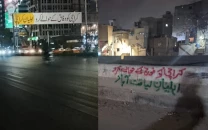The next graveyard of empire
No matter how much cash is given in circular-debt, because energy sector is run poorly, its appetite is never sated.

The writer is the Vice President of the Pakistan Environmental Law Association
The electricity sector is unique in many ways. It is one of the most capital intensive sectors to develop and its product, electricity, must be produced and consumed in sync.
After reforms that began in the 1990s, the electricity sector in Pakistan was ‘unbundled’ — that is, the individual energy and electricity components of the vertically integrated Water and Power Development Authority (Wapda) were separated, their assets transferred to companies established under the Companies Ordinance 1984, to be operated and run independently by the boards of directors. Thus the Wapda thermal electricity generation units became the Generation Companies, the high-voltage transmission grid became the National Transmission and Dispatch Company (NTDC) and the Area Electricity Boards became Distribution Companies such as Lesco, Iesco, Hesco and so on. These ‘unbundled’ units — their governance theoretically separated from the control of WAPDA and the Ministry of Water and Power, are regulated by a Nepra, which grants generation, transmission and distribution licences, sets electricity tariffs and generally regulates the industry. Theoretically.
Several decades and a Pepco later, the energy sector in Pakistan has become a money-sucking black hole. No matter how much cash is shovelled into the circular-debt, because the sector is run so poorly, its appetite is never sated. Now, there are many ways to address the energy crisis in Pakistan. This is because of the very many organisations that operate within it. My experience has been in the distribution side — where distribution companies buy electricity from the National Transmission and Despatch Company (NTDC), sell it to the consumers, collect payments from consumers and repay NTDC — and it is well known that several short-and medium-term efforts can begin to stem the circular debt’s appetite and put the sector on the path of reform.
First, distribution companies need to know just how much electricity they receive from the NTDC. Unless they know how much electricity passes through their system, it’s impossible to correctly asses if any is being stolen or unpaid for. At the moment, Lesco, the country’s largest distribution utility, does not have meters at the common delivery points from where it receives its supply from NTDC.
Second, distribution companies need to know where the electricity in their system is being consumed and by whom. This requires a grid metering system of the type successfully installed and operated by the KESC in Karachi. It requires feeder coding that properly shows where electricity from a grid station is going and to which transformers. The KESC system has helped that company identify areas where electricity theft is high or bill payments low so that areas where theft is low and bill payments high do not suffer the same loadshedding as their energy pilfering neighbours.
Smart meters that transmit consumer usage information directly to the distribution company by way of SMS or radio-frequency transmission, without the interference of a linesman, can dramatically reduce incidents of electricity theft as well as the utility payroll costs (ultimately reducing tariffs).
While these three examples sound simple enough — and they are! —distribution companies across the board have recommended similar measures. The real question is why nothing has been done about them. In my opinion, this is the question upon which all power sector reform turns: the ability of the distribution companies to enforce their own decisions. Put another way: the ability of Pepco and the Ministry of Water and Power to give up the control of the status quo they have so poorly exercised for so long.
To date, the unbundling of Wapda has not come hand-in-hand with a transfer of power to the unbundled entities. To date, the ministry continues to order even the transfer and postings of company employees. These employees do not look to the boards of their companies for orders. They naturally look to the entity that controls their salaries, their promotions and their career prospects. It’s an open secret that the previous secretary conducted two Skype meetings a day with the CEOs of the distribution companies each day. The Secretary acts for the shareholder of the distribution companies, and any decent manager will tell you it’s when the seith starts interfering directly in operations that you know things are heading downhill. During my term at Lesco, the company was served by four CEOs. None were selected or appointed by the board of directors. In fact, the notifications appointing them were not even copied to the board! It’s no surprise that despite regular complaints to the shareholder, over 50 Lesco board resolutions remained unaddressed.
Take also the attempt by the outgoing prime minister, just days before the caretaker set-up was announced, to reverse the 20-year unbundling policy and have the CEOs of distribution companies report directly to the Chairman Wapda. How, how, how can the CEO of a company, established under the Companies Ordinance, be directed to report somewhere other than the board of directors — and that too by notification? Thankfully, good sense prevailed and the notification was withdrawn days later. But this is just an example of the lengths to which vested interests in the power sector will go to protect themselves.
A mandate of a new government, political commitment to address entrenched mismanagement, the opportunities of the Eighteenth Amendment all present a narrow window of opportunity to begin working on energy sector reform. It’s anyone’s guess how things will fare. In the past, the energy sector has been to our government what Afghanistan has been to imperial design: a graveyard of empires.
Published in The Express Tribune, May 19th, 2013.


















COMMENTS
Comments are moderated and generally will be posted if they are on-topic and not abusive.
For more information, please see our Comments FAQ